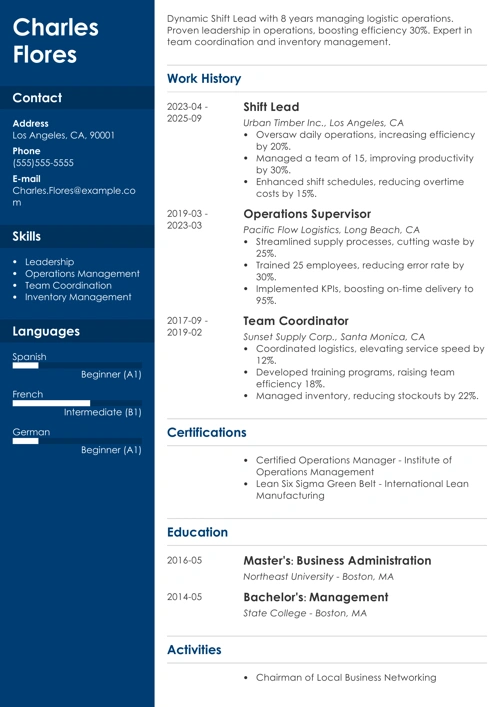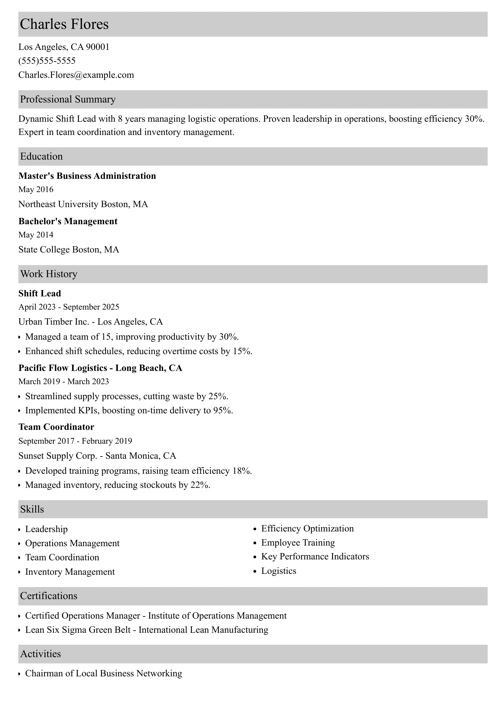Teacher interview questions—cue the anxiety, right? Fret not! We're here to help you prepare for those teaching interview questions. Our expert guide will help you ace the interview and show everyone you're the head of the class. Read on and see our selection of teaching interview questions and answers.
This guide will show you:
- The 25 most common teacher interview questions and answers.
- Tips to ace a teaching job interview, including how to prepare.
- How to answer interview questions for teachers with achievements that impress.
- How to ask your own teaching interview questions for hireability bonus points.
Want to save time and have your resume ready in 5 minutes? Try our resume builder. It’s fast and easy to use. Plus, you’ll get ready-made content to add with one click. See 20+ resume templates and create your resume here.
Sample resume made with our builder—See more resume examples here.
One of our users, Brittanya, had this to say:
Zety really helped me create the best resume possible. It pointed out how things could be better on my existing resume and suggested many things to be re-worded or removed.
Looking for more interview questions for a teacher? Here are the most common job interview questions and answers:
- Common Job Interview Questions and Best Answers
- Typical Phone Interview Questions and Best Answers
- Second Interview Questions
- Interview Questions for an Internship
- Interview Questions for Managers
- Interview Questions That Are Illegal
- Management Style Interview Questions
- Where Do You See Yourself in 5 Years?
10 Most Common Teacher Interview Questions
These teacher interview questions and answers will make the interviewers ask you a question:
“When can you start?”
They cover popular high school interview questions, special education teacher interview questions, substitute or assistant teacher interview questions, and more.
1. Why do you want to be a teacher?
“Why did you become a teacher?” is the most common of all interview questions for teachers.
Administrators want to know you’re motivated to work through inevitable frustrations. And believe me, they’ve heard every generic answer in the books.
“Because I want to help people” won’t work. Find something specific that shows you’re motivated like no other.
Example Answer
I had trouble reading as a child My 4th grade teacher, Mrs. Paulette, introduced us to an amazing list of short stories and books. She read to us and worked with us on reading comprehension. Her care switched on an unquenchable thirst that led me to read thousands of books on topics as diverse as history, biology, sociology, and nature. Mrs. Paulette’s attention forever changed my outlook on life. Since then, I’ve known I wanted to do exactly what she did—to give children tools to last for their entire lives.
2. What is your teaching philosophy?
Teacher interview questions like this ask, “Are you a good fit for our school?” It’s the teaching equivalent of “tell me about yourself.”
But—
Don’t answer elementary teacher interview questions for an unstructured school with, “I believe in structured learning.”
Take the time to learn the school’s philosophy before the interview.
Example Answer
I believe in teaching to each student’s passion. For instance, in one kindergarten class, my students had trouble with punctuation. I observed that one student, Mary, suddenly got excited about apostrophes. I fueled her passion with a big book on punctuation. Her enthusiasm was contagious, and soon the entire class was asking bright and animated questions. Whenever possible, I try to deliver structured lessons in an unstructured way like this.
That answer uses the S.T.A.R. approach to teaching interview questions. It shows a Situation, a Task, an Action, and a Result.
3. How much do you want to know about your students in order to be most helpful to them?
This is another of those interview questions for teachers that depends on the school’s philosophy.
One administrator might think it’s crucial to know every detail. Another might say, “A doctor doesn’t need to know her patient’s favorite ice cream flavor.”
Be honest, but find common ground, as in this teaching interview questions answer:
Example Answer
I need to know a student’s learning styles, passions, and challenges. One difficult student, Tim, was disruptive in class. I joined him on the playground on and off. It turned out he was being bullied after school by his brother’s friends. I spoke with Tim’s parents, and they had no idea. Tim became my star student, and as a result, my whole class got quieter and easier to teach.
How to Prepare for a Teaching Interview:
- Research the school online and talk to teachers. Learn their challenges.
- Brainstorm times you’ve solved problems like theirs (and think of skills you used).
- Practice sample teacher interview questions. Write up your answers and drill with 3x5 cards. When possible, describe a problem you once faced, an action you took, and a positive result for your school or student(s).
- Gather materials like a lesson plan, Praxis scores, and transcripts. Include images as proof of your accomplishments.
We reviewed 11 million resumes generated with our builder and identified the top 10 most commonly listed skills:
- Teamwork and Collaboration
- Problem-solving
- Excellent Communication
- Multitasking
- Attention to Detail
- MS Office
- Analytical and Critical Thinking
- Data Entry
- Project Management
- Team Management
4. Why do you want to work for our school district?
Administrators want to know if you really want this job.
So—find things you love about the school.
Talk to teachers who work there. Check out the school’s website, mission statement, and “About Us” page.
Finally, take some time to think of how you fit.
Example Answer
I respect Snowy Peaks High’s belief in teaching to the whole child. Your focus on academics, character, community, and nature fit perfectly with my own philosophy. It’s easier to teach well-rounded students. The best lesson plan in the world can’t help a child who’s struggling in all other areas of life.
5. How can you help our school/students?
Teacher interview questions like this don’t have to make you blink.
Remember:
Take the time to learn the school’s needs first.
The example below is for a school with a high percentage of disruptive students.
Example Answer
I’ve talked to several of your teachers and heard about their challenges with classroom management. My own classroom management skills are highly developed. I’ve taken 18 continuing education credits in class management from the University of Phoenix’s online program. I was commended at my last school after fully engaging a class with over 25% disruptive students. I used a mix of nonverbal cues, transition cues, timeouts, and several other kernel-based strategies. I believe I can be just as effective here.
6. What do you find most frustrating about teaching?
Teaching interview questions like this attempt to see if you are easily discouraged.
So—your answer has to show your inner strength.
Example Answer
I get very frustrated with bright kids who become overconfident and don’t apply themselves. There’s nothing sadder or more common than wasted potential. At my last position, I worked with several children who weren’t trying. I implemented a research-based program to incorporate student ideas into the lesson plan. The addition of their thoughts created more complete engagement. Test scores went up 15% in just two months.
Pro Tip: Teaching is frustrating. Many common interview questions for teachers focus on that pain. Don’t minimize it. Instead, explain your skills at working through it.
7. Why should we hire you to teach here?
This is the teacher interview questions equivalent of the old standby, “Why should we hire you?”
The example answer below is for a school that wants technology in the curriculum.
Example Answer
I’m well aware of your new technology initiative. We were tasked with the same challenge at my last school. Thanks to my strong tech background, I was able to add online quizzes easily. The students loved them, and they cut administrative processing by 25%.
8. How would you get your classroom ready for the first day of school?
This and similar teacher interview questions look at your preparedness.
First steps create a first impression. Your plan for first steps says a lot about your teaching skills.
Example Answer
I want my classroom to be welcoming and nurturing. I also make the ground rules obvious. A welcome sign and labeled desks help students feel at home from day one. Engaging posters and other visual aids help create a sense of excitement. Beyond fun, a large list of rules and consequences at the front of the room helps the class start on the right foot.
9. Why do we teach (science, math, French, etc.) in school?
Why does your subject matter to you?
If you say, “So they can get good jobs,” you’ll flunk common interview questions for teachers like this.
Think why you care about the subject at a gut level.
Example Answer
I’ve always believed our future depends on regular people using science in day-to-day decisions. Science is at the core of a sense of wonder for our natural world. That wonder can drive students to improve their learning skills. It can take them places they never thought they’d go.

10. How do you evaluate your students?
Common teacher interview questions like this examine how you measure your performance.
As usual, avoid generic answers. Cite an accomplishment and how it helped your students.
Example Answer
I evaluate students with formal and informal methods, including quizzes and tests. I also grade in-class activities like reports, recitations, desk work, and group activities. One student, Terry, showed a strong grasp of concepts during in-class activities, but performed poorly during testing. Through working closely with him, I uncovered an undiagnosed vision problem. Terry got corrective lenses and his test scores rose to match his in-class comprehension.
Beware. Teaching interview questions like the above may look for whether you use assessments vs tests.
15 Less Common Teacher Interview Questions
The next 15 interview questions for teachers aren’t on the A-list.
As one of my teachers used to say, prepare for them anyway because they may be on the test.
You never know which teaching job interview question you might face. More prep = less chance of a flub.
- What are your strengths as a teacher?
- What’s your biggest weakness as a teacher?
- How do you interact with parents?
- Why did you leave your last teaching (or other) job?
- What’s your educational background?
- Where do you see yourself in five years?
- How do you handle classroom management?
- What’s your favorite subject?
- What do you like best about teaching?
- Tell me about your teaching style
- How do you manage your time to get all your teaching duties done within schedule?
- What’s the biggest challenge today’s students face?
- Describe your worst day in class.
- How do you motivate students to learn?
- How have you helped a “tough” student?
Those are the top 25 teacher interview questions and answers. Want one more question to rule them all? That’s coming in a second.
Creating a resume with our builder is incredibly simple. Follow our step-by-step guide and use content from Certified Professional Resume Writers to have a resume ready in minutes.
When you’re done, Zety’s resume builder will score your resume and our resume checker will tell you exactly how to make it better.
The Most Important Interview Question for Teachers
Here’s the ultimate teacher interview question:
“Do you have questions for me?”
Why’s that earthshaking?
- It asks if you’re savvy enough to ask an intelligent question about the job.
- It lets you show your interest.
- It can show you’re an impressive candidate.
- It lets you pry out valuable information about the position.
- It takes time away from their teaching interview questions. That lets you out of the hot seat.
So, do a little head-scratching in advance.
Which of the reverse-teaching interview questions below fit the job opening best?
Which ones show you as the strongest candidate?
Questions to Ask in a Teacher Interview
- What would my goals be for the first year?
- What’s the average classroom size?
- What’s the school’s culture like?
- Do you have an active PTA?
- What are the other teachers like?
- How is the interaction between the school and the parents?
- What do the other teachers like most about this school?
- How do you handle bullying?
- How do you approach student discipline?
- How do you measure teacher success?
Any of those questions to ask in a teaching interview will show you know your way around a lesson plan.

That’s it for our list of 25+ common interview questions for teachers. Want more reverse-teacher interview questions? See our guide: 65+ Best Questions to Ask in an Interview & Land Top Jobs
Teacher Interview Tips
Bad dream:
You walk into the teaching interview. You sit. You’re sweating buckets.
They start asking questions. You umm and ahh.
Suddenly you realize you’re in your underwear.
Sound familiar?
Before we wrap up the top 25 teacher interview questions and answers, let’s take one minute to prepare.
The teacher interview tips below will jack your confidence up to the ceiling tiles.
Teaching Interview Tips
- Know the lingo. What are AYP goals? Who are Wiggins and Marzano? What are rubrics? What should you know about proficiency-based models? Brush up on your terms and be ready to discuss them.
- Prepare for common interview questions for teachers. Learn the school’s needs. Then brainstorm accomplishments that show how you can help.
- Bring a portfolio. It’s not for them to read. It’s evidence of your teaching interview answers. Bring materials that shows achievements, like lesson plans, worksheets, and images.
- Dress professionally—more professionally than you would for work. That sends the message that you take the interview seriously.
- Listen. The more you ask and listen, the fewer interview questions for teachers you’ll have to answer. Plus, interested = interesting.
- Make eye contact with the principal and all other interviewers.
What to Bring to a Teaching Interview:

In a teaching interview, you may face situational interview questions. Those usually start with “Tell me about a time...” Need help prepping? See our guide: 20 Situational Interview Questions and Answers to Nail Your Interview
Want more interview tips for teachers and other jobs? See our guide: 50+ Successful Interview Tips, Advice & Guidelines
Plus, a great cover letter that matches your resume will give you an advantage over other candidates. You can write it in our cover letter builder here. Here's what it may look like:
See more cover letter templates and start writing.
Key Takeaway
Here’s a recap of common teacher interview questions and answers:
- Prepare. Read the 25 teaching interview questions in this guide. Spend the most effort on the top 10.
- Do your homework. Learn the school’s needs—both online and by talking to their teachers. Prep answers that prove you’ve got solutions.
- Ask questions. Pick a few general interview questions above. They’ll show you’re present and accounted for.
About Zety’s Editorial Process
This article has been reviewed by our editorial team to make sure it follows Zety's editorial guidelines. We’re committed to sharing our expertise and giving you trustworthy career advice tailored to your needs. High-quality content is what brings over 40 million readers to our site every year. But we don't stop there. Our team conducts original research to understand the job market better, and we pride ourselves on being quoted by top universities and prime media outlets from around the world.





